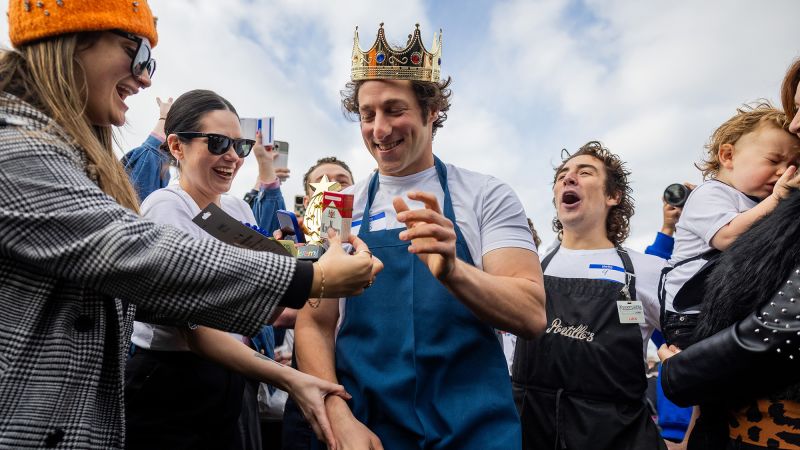
Celebrity lookalike contests are taking over the internet. But they aren’t new
CNN
Jeremy Allen White, Timothée Chalamet and Glen Powell. Celebrity lookalike contests may be going viral now but they’re actually a time-honored form of entertainment.
In German folklore, doppelgängers are considered to be a bad omen whose presence brings about misfortune. It feels all the more fitting then, that amid today’s geopolitical conflicts, increasing climate catastrophes and economic uncertainties, we’re seemingly hooked on celebrity lookalike contests. It began with actor Timothée Chalamet. In October, hundreds of onlookers turned up at Washington Square Park to watch more than a dozen chocolate-haired 20-somethings jostle for the title of Chalamet’s unofficial doppelgänger. The event, organized by YouTuber Anthony Po, ended in a handful of arrests, a $500 fine and an appearance from the Oscar-nominated actor himself. “It was insane,” Reed Putman, a Chalamet lookalike contestant, told CNN after the competition. “People were flooding (around you) recording you and taking photos or asking quick questions.” After that, things moved quickly. In Ireland, mulleted men compared thighs in 5-inch Gaelic Athletic Association shorts, hoping to have their likeness to Paul Mescal verified by a jumbo cheque for €20 ($21) (a second contest took place at a pub in London, apparently making Mescal the first actor to inspire two competitions). Days later, more young men, this time dressed in pussy-bow blouses and three-strand pearls, piled into London’s Soho Square looking to be crowned the best Harry Styles lookalike. Then there was the search for actor Dev Patel’s doppelgänger in San Francisco, and singer Zayn Malik’s in New York. And not since the taping of a “Top Chef” episode has so many apron-wearing men gathered in one place for the Jeremy Allen White competition in Chicago earlier this month. There were cigarettes, farmer’s market flowers and yards of fake tattoos — all in reference to paparazzi shots of White as well as his character Carmy Berzatto in “The Bear.” Just this past week, Zendaya — because who else? — became what appears to be the first female celebrity to have her own viral lookalike contest in Oakland, California while one for actor Glen Powell was held over the weekend in Austin, Texas. Thanks to social media a new competition poster seems to go viral each week, with many awarding a small cash prize and an item associated with the celebrity or celebrity’s character (White’s lookalike took home a pack of Marlboro Reds, while the organizers of Zendaya’s contest threw in a bottle of shampoo and conditioner of a brand that the actor reportedly uses). Like a dog whistle for a particular type of online Gen Z or Millennial, these contests spread like wildfire. But the idea of a lookalike contest is in fact a time-honored form of entertainment. In his memoir, Charlie Chaplin Jr. wrote that his famous father had not only entered but came third in his own lookalike competition — held at Grauman’s Chinese Theater in Hollywood sometime between 1915 and 1921. (Dolly Parton said she also participated in one held of her, at a gay bar in Santa Monica decades later. She lost). There were Shirley Temple contests in the 1930s — including one in Sydney, Australia in 1934 and one in 1935 at the Cleveland Food Show, where more than 900 children entered. The event was so popular, the Cleveland organizers reportedly staged three more — one for femme fatale Myrna Loy, one for singer Alice Faye and one for actor Katharine Hepburn. For the last 40 years, a bar in Key West, Florida has been staging an annual Ernest Hemmingway lookalike competition.






